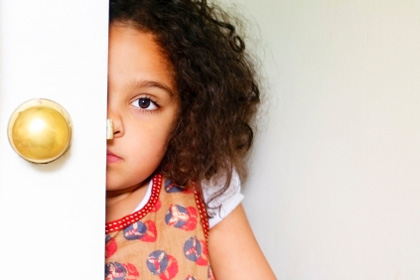 Attend a crowded party, noisy and in full swing, and you’ll find that some guests are completely in their element, while others are mentally mapping their escape route. They’d prefer a quiet café and some good historical fiction.
Attend a crowded party, noisy and in full swing, and you’ll find that some guests are completely in their element, while others are mentally mapping their escape route. They’d prefer a quiet café and some good historical fiction.
Dr. Marti Olsen Laney, a Portland psychotherapist, explains these personality differences in her book The Hidden Gifts of the Introverted Child. Introversion and extroversion, she says, are basic innate temperamental traits.
It turns out, says Laney, that introversion is related to “energy management.” In a society buzzing with activity, introverted children often find themselves frazzled and craving downtime. “The introverted child draws energy from within,” she says. “She needs to have access to her thoughts, feelings and perceptions in order to have a sense of vitality and equilibrium. Too much external stimulation is depleting to her and leaves her feeling drained.”
But what if your introverted child opts to play alone? Should you be worried? Possibly, says Dr. Liliana Lengua, a psychology professor at the University of Washington. Parents should try to figure out why their child chooses solitary play, she says. “Ask yourself, ‘Does my child prefer to be alone because of a true preference and a way to draw energy, or is it just comfortable to be alone because of anxiety or a lack of certain social skills or abilities?’”
Pay attention to your child’s social interactions and development, Lengua advises. “Notice whether your kids are achieving the basic social milestones that are expected for their age,” she says. “Do they have a good solid friendship or two? Do they have some skills in talking to adults? It’s a careful balance of accepting children for who they are, responding to their preferences, but also gently nudging them into things they might be avoiding doing.”
Bellevue fifth-grader Kaley Thompson often chooses solitary play over playdates. After school, Kaley needs an hour to herself before her mom, Laurie Thompson, can chat with her about her day. Thompson doesn’t worry. “When I volunteer in her classroom, clearly children are engaging with her, and she is engaging back. She has always been able to talk to people, and it is obvious people like her. When we get together with family friends, she will happily go off and do what the other kids are doing,” says Thompson.
Focus and concentration
There are upsides to introversion, says Laney. Introverts enjoy delving deeply into a subject and can focus for a long time. They do well in college and often become experts in their chosen field. “Fields such as science, computers, medicine, engineering, architecture, psychology and higher education are dominated by introverts, due to their unusual ability to deeply concentrate on complex information,” she says.
Unfortunately, this focus may come at the expense of speed. “At school, it’s helpful for introverted children to be allowed to go home and think about things to be discussed the following day,” says Laney. “They may freeze if put on the spot.” Because of this, teachers can sometimes underestimate how much introverted kids understand.
Introverts are often drawn to individual activities such as art, writing and music. “Life’s creative solutions require alone time. Solitude is required for the unconscious to process and unravel problems,” writes psychologist Ester Buchholz, Ph.D., in Psychology Today. “Both creativity and curiosity are bred through contemplation.”
Close friendships
How do introverts fare in the friendship arena? Better than you might expect. Although introverted children often have a smaller circle of friends than extroverts do, their relationships tend to be close and meaningful. “Introverts are loyal, caring and sensitive to others’ feelings, all of which make a good friend. They take time to forge connections, but once they do, it’s for the long haul,” says Laney.
Thompson says she and her husband make sure that when Kaley is ready to talk about her thoughts, they are there to listen. “When she wants to discuss things, you can tell she’s already thought about them a lot. She wants to fill in the whole picture by sharing and asking a lot of questions. She wants to talk about justice and peace. It’s amazing to have a conversation like that with anyone, but to have it with a kid is really fascinating.
These kinds of verbal exchanges are meaningful to introverts. It’s how they connect. “Although they may be less demonstrative, introverted children show love by sharing their inner thoughts with you,” says Laney.
So take a cue from your child: Find a quiet place and have a real conversation. Simply put, embrace your inner introvert.
Laura Mackenzie is a freelance writer. She lives in Redmond with her husband and two kids, ages 7 and 11.









